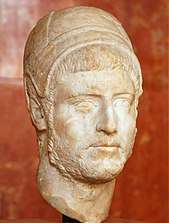Flamen Martialis
In ancient Roman religion, the Flamen Martialis was the high priest of the official state cult of Mars, the god of war. He was one of the flamines maiores, the three high priests who were the most important of the fifteen flamens. The Flamen Martialis would have led public rites on the days sacred to Mars. Among his duties was the ritual brandishing of the sacred spears of Mars when the Roman army was preparing for war.
| Priesthoods of ancient Rome |
|---|
 Flamen (250–260 CE) |
| Major colleges |
|
Pontifices · Augures · Septemviri epulonum Quindecimviri sacris faciundis |
| Other colleges or sodalities |
| Fetiales · Fratres Arvales · SaliiTitii · Luperci · Sodales Augustales |
| Priests |
|
Pontifex Maximus · Rex Sacrorum Flamen Dialis · Flamen Martialis Flamen Quirinalis · Rex NemorensisCurio maximus |
| Priestesses |
| Virgo Vestalis MaximaFlaminica Dialis · Regina sacrorum |
| Related topics |
| Religion in ancient Rome · Imperial cultGlossary of ancient Roman religionGallo-Roman religion |
Like other flamines maiores, the high priest of Mars was a patrician and required to marry through the ceremony of confarreatio.[1] It is not clear whether the death of his wife required him to resign his duties, as was the case for the Flamen Dialis.
Duties
At the Larentalia in April, the Flamen Martialis poured libations in honour of Acca Laurentia, wife of Faustulus, the foster-father of the Rome's twin founders, Romulus and Remus.[2] It is assumed by modern scholars, though nowhere specifically stated in any ancient source, that the Flamen Martialis presided over the October Horse, a sacrifice of a horse to Mars in the Campus Martius.[3]
The major flamens were placed under several religious prohibitions that restricted their military and political careers. In the 240s BC, for instance, the consul Aulus Postumius Albinus could not assume his military command, because the pontifex maximus Lucius Caecilius Metellus invoked the prohibition against a Flamen Martialis leaving the city.[4]
List of Flamines Martiales
The priesthood was held for life; dates given below represent the year in which the priesthood is recorded.
- Aulus Postumius Albinus (consul 242 BC), c. 244 BC.
- Marcus Aemilius Regillus, d. 204 BC.
- Lucius Veturius Philo, his successor in 204 BC.[5]
- Publius Quinctilius Varus, d. 169 BC.[6]
- Lucius Postumius Albinus, consul 154 BC, successor of the preceding in 168 until his death during his consulship.[7]
- Lucius Valerius Flaccus, consul 131 BC. He probably succeeded L. Postumius Albinus in 154 BC.[8]
- Lucius Valerius Flaccus, consul 100 BC and princeps senatus in 86 BC.
- Lucius Cornelius Lentulus Niger (d. 56 BC?), successor of the preceding in 69 BC, and notable for the detailed record of the pontifical dinner held for his inauguration.[9]
- Lucius Cornelius Lentulus, c. 25 BC[10]
- Gaius Junius Silanus, AD 10.[11]
References
This article is based on a portion of the article "Flamen" in Smith's Dictionary of Greek and Roman Antiquities (1875), in the public domain.
- Servius, note to Aeneid iv.104, 374; Gaius, i.112.
- Plutarch. "Life of Romulus"
- C. Bennett Pascal, "October Horse," Harvard Studies in Classical Philology 85 (1981), p. 262.
- Livy, Au Urbe Condita 19.
- Livy 29 38 6; Israel Shatzman. "Patricians and Plebeians: The Case of the Veturii" The Classical Quarterly, New Series, Vol. 23, No. 1 (May, 1973), pp. 65-77.
- Livy, History of Rome, xliv. 18.
- Livy, History of Rome, xlv.15.
- Robert Broughton, The Magistrates of the Roman Republic, New-York, The American Philological Association, 1951 et 1952, vol. 1, p.451.
- Patrick Tansey. "The Inauguration of Lentulus Niger" American Journal of Philology 121:2 (2000) pp. 237-258.
- Name on a Roman silver coin, the denarius, in the reign of Augustus. See this page for a description of the coin. The probable year is 25 BC.
- Fasti Capitolini, AE 1927, 101; 1940, 59, 60.